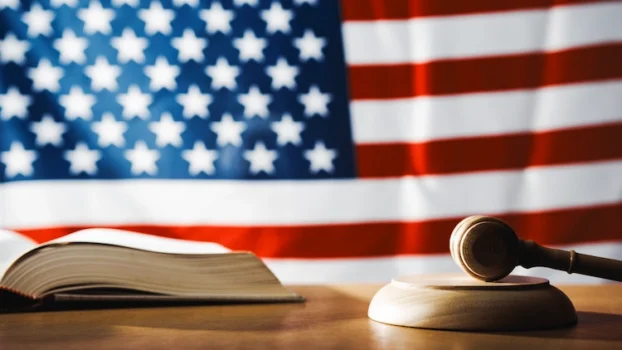
In M.A. v. J.H.M. (A-1-24/089673) (Decided May 27, 2025), the Supreme Court of New Jersey held that a defendant in a Prevention of Domestic Violence Act (PDVA) final restraining order (FRO) hearing may invoke the privilege against self-incrimination in response to specific questions that raise reasonable risks of self-incrimination. The unanimous Court further held that no adverse inference may be drawn from the exercise of that right.
Facts of M.A. v. J.H.M
Plaintiff, M.A., and defendant, J.H.M., were married in 2019 and have one son together. Plaintiff and her son moved out of the marital home in January 2023, and she initiated divorce proceedings in March 2023. In April 2023, police arrested defendant and charged him with various weapon offenses after he used a handgun to threaten the process server who was attempting to deliver divorce papers to him. Defendant’s weapons were seized and he was granted pre-trial release. In July 2023, plaintiff filed a civil complaint, pursuant to the PDVA, seeking a temporary restraining order (TRO), alleging that defendant committed the predicate offenses of stalking and harassment. The court issued plaintiff a TRO prohibiting defendant from having any contact with her, granting her temporary custody of their son, and denying defendant parenting and visitation time until further notice.
The FRO hearing took place over several days, and plaintiff called defendant as a witness. Defense counsel invoked the privilege against self-incrimination on behalf of defendant, claiming defendant could rightfully refuse to provide any testimony. Over defense counsel’s objections, the trial court ordered defendant to take the stand, swear an oath, and undergo direct examination. Defendant gave his name when asked but invoked the Fifth Amendment in response to the next question — whether he was married to plaintiff. Counsel for plaintiff and defendant argued over whether the Fifth Amendment could properly be invoked and to what extent. Plaintiff’s counsel proffered that he intended to ask questions about driving by plaintiff’s house and calling her at work, the alleged acts on which plaintiff’s complaint was based. Defense counsel insisted that the Fifth Amendment protected defendant because he could still be charged with harassment and stalking at a later time, as the statute of limitations had not yet expired. The court ruled in favor of plaintiff but stayed the matter pending defendant’s decision to appeal.
The Appellate Division denied leave to appeal. While defendant’s motion for leave to appeal was pending before the Court, the Appellate Division published T.B. v. I.W., 479 N.J. Super. 404 (App. Div. 2024), which addresses an issue substantially similar to the question presented in this case. There, the Appellate Division held that “a trial court may not draw an adverse inference in an FRO proceeding based solely upon defendant’s decision to invoke his Fifth Amendment right to not testify.”
NJ Supreme Court Decision in M.A. v. J.H.M
The New Jersey Supreme Court reversed. “We hold that although the Fifth Amendment does not afford a defendant in a PDVA FRO hearing blanket immunity, a defendant may invoke the privilege against self- incrimination in response to specific questions that raise reasonable risks of self-incrimination, and that no adverse inference may be drawn from the exercise of that right,” Justice Noriega wrote. “Further, we hold that the PDVA immunity provision contained in N.J.S.A. 2C:25-29(a) is not coextensive with the privilege against self-incrimination and is therefore insufficient to safeguard a defendant’s rights under the Fifth Amendment.”
In reaching its decision, the New Jersey Supreme Court largely agreed with the Appellate Division’s reasoning in T.B. v. I.W. Most notably, it agreed that the PDVA’s limited immunity provision is not sufficient protection for a defendant’s Fifth Amendment rights because it does not foreclose the possibility of future prosecution in actions related to the underlying predicate offenses or possible criminal actions beyond those related to the predicate offenses underlying the FRO hearing.
“The statutory immunity provision in N.J.S.A. 2C:25-29(a) does not satisfy the constitutional standard for immunity because it is not coextensive with the Fifth Amendment,” Justice Noriega explained. “The immunity provision lacks derivative use protection by leaving open the possibility that law enforcement may build a criminal case using leads obtained from compelled testimony at the FRO hearing — precisely what the Fifth Amendment’s privilege against self-incrimination prohibits.”
The New Jersey Supreme Court went on to emphasize that its holding does not allow a defendant to invoke a blanket privilege as to all testimony in a PDVA hearing. Rather, the privilege must be asserted on a question-by-question basis, and the defendant must “ha[ve] reasonable cause to apprehend danger from a direct answer” according to the clear framework for evaluating the proper invocation of the Fifth Amendment privilege set forth in Hoffman v. United States, 341 U.S. 479, 486-87 (1951). By way of example, the Court distinguished the question regarding defendant’s marital status from questions like “[d]id you place the phone call to my client on July 5,” which could potentially subject the defendant to criminal liability.
